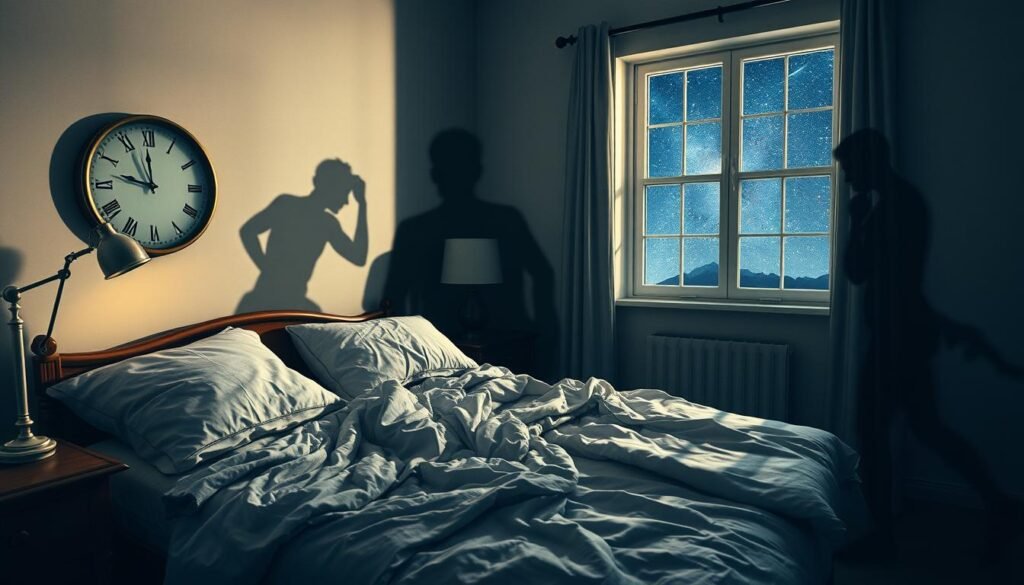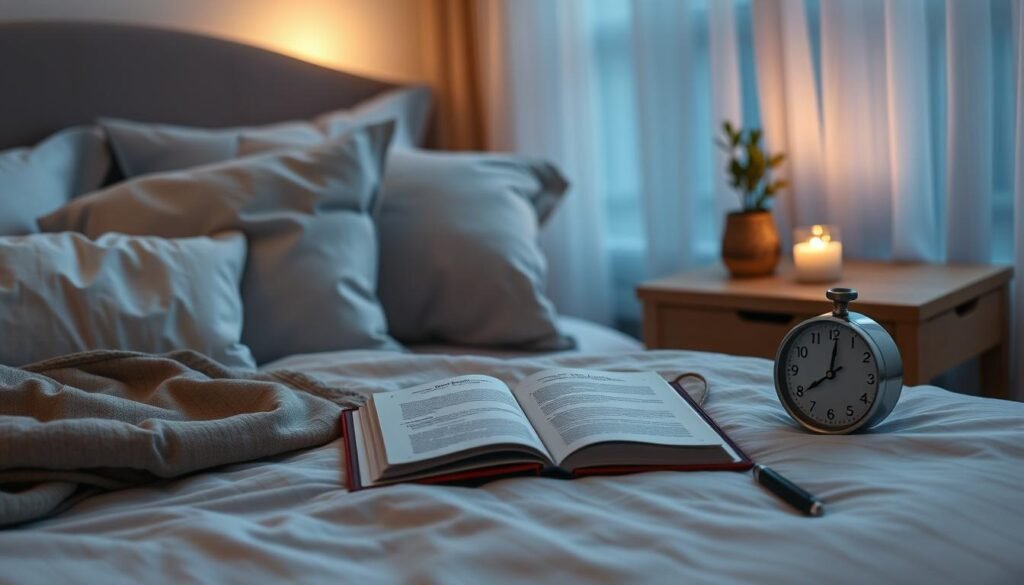About one in five Americans can’t fall back to sleep after waking up at night. This fact means many people are caught in a cycle where being exhausted makes it hard to sleep. It’s a paradox that’s becoming more common, as stress and anxiety rise in today’s fast-paced world. Luckily, this article will show you six simple but powerful ways to break free from this cycle and enjoy better sleep.
These methods range from sticking to a regular sleep schedule to getting more physical exercise. Each technique is aimed at overcoming the exhaustion and sleeplessness that many face.
Key Takeaways
- Understanding the cycle of insomnia can help address the underlying issues.
- Bright light exposure in the morning can shift your sleep-wake pattern.
- Consistent sleep schedules are vital for improved sleep quality.
- Physical activity promotes better sleep and reduces daytime drowsiness.
- A comfortable sleep environment plays a crucial role in achieving restful nights.
- Deep breathing techniques can enhance mental clarity and energy levels.
- Cognitive behavioral therapy may help alleviate anxiety-related sleep issues.
Understanding the Cycle of Insomnia from Fatigue
Fatigue often triggers insomnia, setting off a hard cycle for many. It can come from stress, lifestyle, or health problems. This fatigue leads to mental burnout, making daily tasks seem daunting. With the need for rest, the struggle to sleep only heightens anxiety and blocks the path to peaceful sleep.
Insomnia leaves people feeling drained, making the cycle worse. This results in less productivity and poor health. Some symptoms include trouble focusing and lower brain function. A study showed that one-third of adults face occasional insomnia, and 10 to 15 percent have it chronically. This ongoing lack of sleep builds more fatigue and health issues. It highlights why it’s key to tackle these problems early.
To handle insomnia, it’s vital to see how it connects with fatigue and mental wellness. Getting help from experts, like mental healthcare, has helped many sleep better. By knowing what causes their insomnia, people can work on solutions to sleep well again.
What Causes Tiredness Preventing Sleep?
Many reasons contribute to the difficulty of falling asleep. These include health problems, the effects of some medications, and bad habits. Knowing why can help tackle insomnia better.
Medical Conditions Contributing to Insomnia
Some health issues can make you feel constantly tired and mess with your sleep. Sleep apnea, hypothyroidism, and diabetes are common causes of this fatigue. Anemia and mental health issues like depression also play a role. This makes it hard to break the cycle of exhaustion and restless nights. If you have these symptoms, seeing a doctor could help find out why sleep is elusive.
Impact of Medications on Sleep Quality
Medicines for heart problems, asthma, and mental health can sometimes make it hard to sleep. Steroids and certain antidepressants might keep you awake. Talking to a doctor about these side effects is important. They can help ensure your meds aren’t making your sleep issues worse.
Behavioral Patterns that Worsen Sleep Issues
Bad habits like too much screen time, sleeping at odd hours, and napping late can harm your sleep quality. These actions make your body associate bed with being awake. Making positive changes, like cutting down on screens at night and sleeping at regular hours, benefits sleep health and overall wellness.

Too Tired to Sleep: The Vicious Cycle
The journey of sleeplessness often starts a vicious cycle. This cycle’s struggle to sleep leads to growing anxiety. This anxiety makes a person feel both tired and too awake, keeping the unrest going. Studies say about 30% of adults face insomnia at some time, and around 10% deal with it chronically. Each sleepless night makes the next day harder, with more exhaustion and irritability. This creates a loop that seems hard to break out of.
Being tired yet awake leads to more stress. This stress then makes sleep even worse. Research shows that those with anxiety disorders have trouble falling asleep and wake up a lot at night. Insomnia can also increase heart issues and may affect thinking over time. This situation makes getting good sleep even more crucial.
To break this cycle, making sleep a priority is key, along with trying other therapies. Natural methods like acupuncture and meditation are gaining attention for their benefits. Adding natural remedies might help get your sleep back on track.
To escape the cycle, taking control of your sleep and health is vital. Forming steady habits and a sleep-friendly setting can help recharge each night. Realizing the value of a solid routine is fundamental in tackling the challenges of fatigue and wakefulness.
Breaking the Cycle: Establishing a Routine
Creating a routine is key to better sleep. Sticking to a regular sleep schedule tells your body when to shut down. This approach improves sleep habits and fights insomnia and fatigue.
Consistency in Sleep Schedule
Setting a regular bedtime helps your body get ready for sleep, making rest easier to come by. Adults should aim for at least seven hours of sleep for their well-being. Here are some tips for keeping a consistent schedule:
- Go to bed and wake up at the same time each day.
- Engage in calming pre-sleep activities to signal the body that it’s time for rest.
- Avoid heavy meals, caffeine, and stimulating activities close to bedtime.
The Importance of Morning Light Exposure
Exposure to morning light acts as a natural wake-up call, helping keep our internal clocks in check. It cues our bodies to start the day. Following these steps can maximize morning light benefits:
- Try to wake up around the start of daylight hours.
- Spend time outdoors or near a window to soak up natural sunlight.
- Avoid excessive screen time in the morning, as artificial light can disrupt this natural process.

Building a routine centered around consistent sleep times and morning light benefits fights against insomnia and fatigue. A structured daily routine leads to better nights of rest, thus improving sleep quality in the long run.
Physical Activity and Its Role in Sleep Quality
Regular physical activity helps to improve sleep quality a lot. Studies back up the link between working out and sleeping better. When we do certain exercises, it helps us feel tired and sleep well at night.

Recommended Types of Exercise for Better Sleep
Some exercises are better for sleep, such as:
- Brisk walking: It’s a simple way to get more active.
- Yoga: This blends movement with being mindful, which helps reduce stress and calm the mind.
- Swimming: Swimming works out the whole body and feels refreshing.
- Moderate aerobic exercises: Things like biking or dancing are good for sleep.
People who exercise for 30 minutes every day tend to sleep longer and better.
Timing Your Workouts for Optimal Sleep Benefits
The best time for exercise matters too. Working out in the late afternoon or early evening is best. However, exercising late at night might not always be good. It can make it hard for some people to fall asleep.
Try to end hard workouts 1 to 2 hours before bed. This lets your body relax and get ready for sleep. Watching how your body responds to different exercise times can help you sleep better.
Avoiding Stimulants: The Caffeine Connection
Caffeine affects sleep quality deeply. Around 85% of Americans drink caffeine every day. This creates a tough cycle, making it hard to sleep well. Knowing how caffeine impacts sleep is key for better rest and health.
Understanding Caffeine’s Impact on Sleep
Caffeine is a stimulant that stays in your body for a long time. It blocks a sleep-promoting brain chemical. This makes falling asleep hard and messes up your sleep cycle. Too much caffeine cuts down on deep sleep, which we need to feel rested and think clearly.
Strategies for Reducing Caffeine Intake
Lowering caffeine can make your sleep better. Here are a few tips:
- Limit caffeine later in the day.
- Cut back slowly to dodge withdrawal symptoms.
- Try herbal teas or decaffeinated coffee.
- Know the caffeine in foods and drinks to manage it better.
- Understand your caffeine limits and stick to them.
It’s important for parents to watch how much caffeine their kids have. Pregnant or nursing women should limit their caffeine too. People with health issues should talk to a doctor about caffeine. Note that the FDA says caffeine in soda is safe, but other foods and drinks aren’t strictly regulated.
| Product | Caffeine Content (mg per serving) |
|---|---|
| Coffee (16 oz) | 259 – 564 |
| Tea (8 oz) | 47 – 65 |
| Energy Drink (8 oz) | 80 – 160 |
| Soda (12 oz) | 30 – 60 |
Being smart about caffeine, especially at night, can improve your sleep. Making an effort to cut down on caffeine helps create a healthy sleep pattern and stops insomnia. For deeper insights, check out this resource.
The Role of Electronics in Sleep Disturbances
Electronics improve our lives but they can harm our sleep. The blue light from phones, tablets, and computers affects our sleep quality. It can mess with our health.
How Blue Light Affects Sleep Quality
Blue light from gadgets stops melatonin, which we need for sleep. This light messes with our body’s clock, making it hard to sleep. Most people use gadgets before bed, leading to poor sleep for many.
Tips for Reducing Electronic Distractions Before Bedtime
To sleep better, try these steps:
- Stop using gadgets an hour before bed.
- Wear blue light glasses at night.
- Keep lights low to help melatonin.
- Don’t charge devices in your room.
- Use apps that cut blue light or night mode.
These tips can help you avoid sleep problems from electronics. Creating a better sleep space is possible.
| Device Type | Sleep Latency Risk (OR) | Percentage of Users Reporting Sleep Disturbances |
|---|---|---|
| Smartphones | 1.98 | 80.7% |
| Tablets | 1.44 | N/A |
| Computers | Varies | N/A |
Knowing how electronics and blue light affect sleep can improve our sleep health. Simple changes can make big differences in our sleep quality.
Creating a Sleep-Friendly Environment
Creating a sleep-friendly environment is key to rejuvenating your body and mind. A well-set-up bedroom can lead to comfortable, restful sleep. This means waking up feeling revitalized and sharp. Various factors play a role in making a room more conducive to sleep.
Ideal Bedroom Conditions
When aiming for the perfect bedroom atmosphere, keep these in mind:
- Temperature: A cool room, about 65 degrees Fahrenheit, aids in getting restful sleep.
- Darkness: Blackout curtains help achieve total darkness, encouraging deeper sleep.
- Noise Control: White noise devices or special curtains keep outside noises away, ensuring a peaceful environment.
- Air Quality: Fresh, well-aired spaces are crucial for a sleep-friendly bedroom.
Importance of a Comfortable Sleep Setting
A cozy sleeping environment plays a crucial role in sleeping well at night. Important factors include:
- Mattress Selection: The right mattress can ease back pain and enhance sleep quality.
- Bedding Quality: High-quality sheets and pillows increase comfort and help maintain an ideal body temperature overnight.
- Decluttering: A clean, organized room without distractions aids in relaxation before bed.
- Aromatherapy: Scents like lavender essential oil add to a tranquil sleeping experience, encouraging deeper rest.
Adopting these steps leads to a snug sleeping area perfect for unwinding and snoozing. Committing to such improvements not only betters sleep quality but also boosts overall health.
| Element | Ideal Condition |
|---|---|
| Temperature | 65°F (18.3°C) |
| Light | Darkness with blackout curtains |
| Noise Level | Minimal with noise-blocking curtains |
| Air Quality | Well-ventilated and fresh |
| Mattress | Supportive and suitable for individual needs |
| Bedding | High quality for comfort |
| Clutter | Minimal distractions |
| Aromatherapy | Calming scents such as lavender |
Conclusion
It’s important to understand how fatigue can lead to insomnia. This article shared six ways to fight this problem. By setting a sleep schedule, being active, cutting down on caffeine, avoiding screens before bed, making a cozy sleep space, and getting help if needed, you can improve your sleep.
Not getting enough sleep, which means less than 7 hours a night, can really affect your thinking and health. This lack of sleep can make you feel more tired, keeping you in a cycle of not sleeping well. The tips we talked about can break this cycle, leading to healthier sleep habits and a better quality of life.
In today’s busy world, it’s easy to let sleep slide. But it’s crucial to make it a top priority. Making these changes can help you find a balanced sleep schedule and feel more alive. Remember, fighting off insomnia caused by tiredness takes determination and patience, but getting enough rest is definitely worth it.